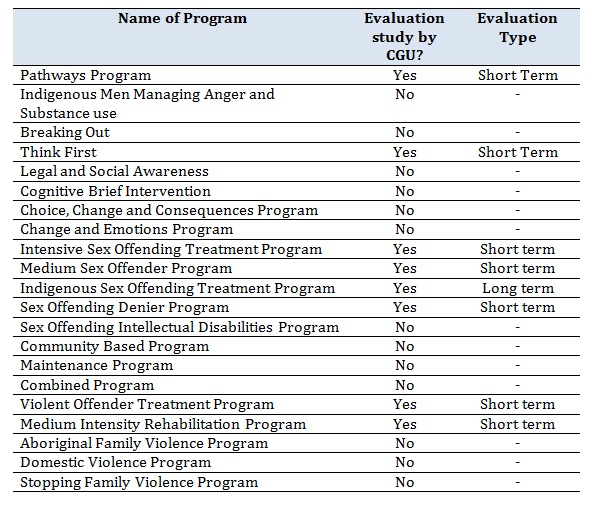Out of the 21 treatment programs that are currently operating in the Department, only eight have had an evaluation study completed by the Clinical Governance Unit (CGU) that have examined short or long term impacts and only one has been the subject of long term evaluation. None of these evaluation studies have been publicly released.

All of the evaluations bar one are short-term in nature – examining prisoner’s treatment gains via self-reported survey results and the accuracy of prisoner placement based on treatment checklist scores. This type of evaluation measures the impact of the program on the prisoner and is may be useful to allow improvements in the way a program is delivered. However, this type of evaluation provides no information on the effectiveness of a program. Long term, outcome evaluation is needed.
Only two long term evaluation studies of programs have been completed by CGU. One program was found to be ineffective and was discontinued. The other program was designed for medium risk sex offenders. The evaluation found that some high risk prisoners were incorrectly allocated to this program. Paradoxically, the program decreased reoffending among high risk sex offenders and increased reoffending among medium risk sex offenders. CGU staff stated that when these results became known, they removed the program immediately. The Department currently provides a revised version of the program and it is not yet known whether this version has the same adverse effect on prisoners. Unfortunately, an earlier independent evaluation of a previous version of sex offender treatment programs also produced rather negative results.
Programs aimed at reducing recidivism need to be reviewed regularly and refined to adapt to changes in prisoner needs and to maximise their chance of success. Since the creation of CGU the Department has rightly made significant changes to the suite of programs that are available to prisoners, however the by-product of introducing new programs is that outcome evaluation has rarely been possible. It will be a number of years until definitive results are available on the effectiveness of many Departmental programs. While new programs which more accurately target the needs and risk profiles of specific prisoner cohorts is welcomed, the Department must now consider ways to balance the need for innovation with the need to ensure effectiveness.
The lack of robust evaluations is not acceptable for reasons of community protection and resource management. Unfortunately it is also a longstanding problem. Without good evaluations, scarce resources cannot be effectively targeted. Furthermore, key decision makers such as the Prisoners Review Board are making decisions, sometimes to release a person into the community, and sometimes to keep them in prison at considerable financial cost, on the basis of programs that have not been shown to be effective. A comprehensive plan for program evaluation needs to be developed to ensure that established programs are subject to long term, outcome evaluation and changes to the program suite do not stifle the ability to measure effectiveness.